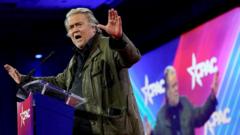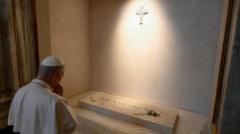A glimpse into the election of Pope Francis reveals a transformative period for the Catholic Church, marked by change and challenges that have reshaped its future.
Pope Francis: A Decade of Transformative Leadership Since 2013 Election

Pope Francis: A Decade of Transformative Leadership Since 2013 Election
Reflecting on the historic election of Pope Francis and his impact on the Catholic Church over the last decade.
In March 2013, when Jorge Mario Bergoglio, a cardinal hailing from Argentina, ascended to the papacy as Pope Francis, history was made. He became the first South American and the first Jesuit to lead the Roman Catholic Church, breaking a 1,200-year European tradition. His appointment signified a pivotal moment, indicating a shift in focus towards the global South, where the majority of Catholics reside.
Pope Francis, known for his humble beginnings as the son of Italian immigrants and his commitment to poverty alleviation, took over the helm at a time fraught with significant issues. The Church was grappling with a declining number of priests, the rise of evangelical churches predominantly in the Southern Hemisphere, and an ongoing sexual abuse scandal that had severely damaged its moral standing in the West.
In the conclave preceding Francis' election, cardinals engaged in extensive deliberations regarding the pressing issues at hand and the qualities they sought in the next pope. Cardinal Christoph Schönborn of Vienna highlighted the distinction between the papal role and corporate leadership, emphasizing that the pope must serve as the spiritual guide for a diverse community rather than as an executive of a vast organization.
As Pope Francis approaches a decade in leadership, his journey remains a subject of considerable discourse, particularly in light of the challenges he has faced and the impact of his policies on the global Catholic community.





















